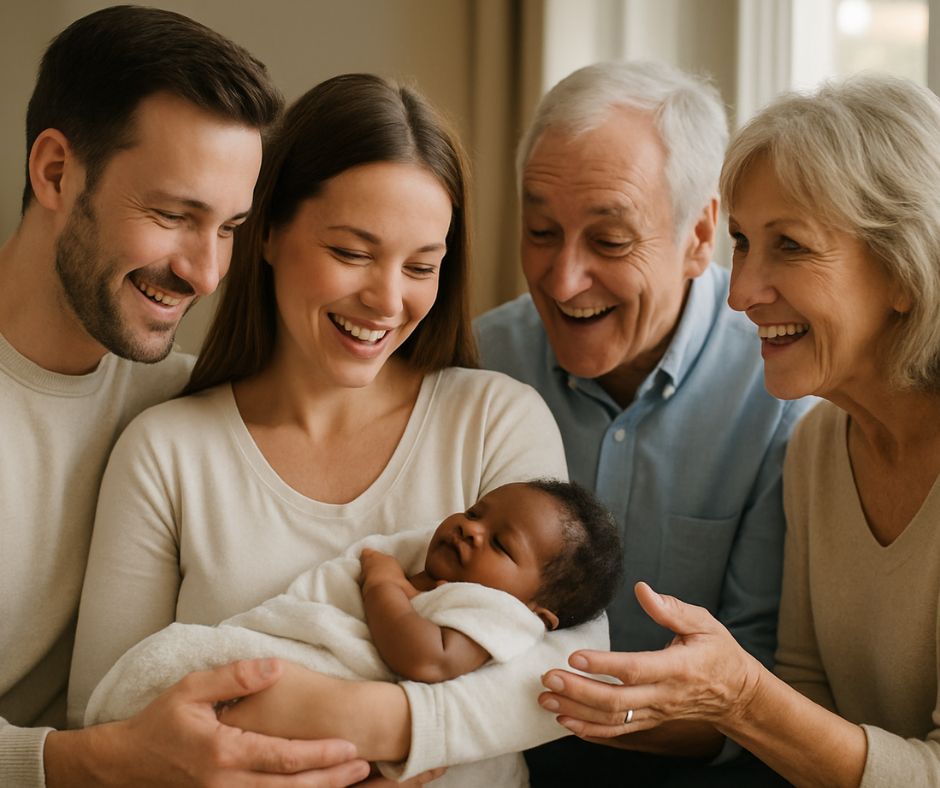So, you’re preparing to grow your family through adoption — congrats! That’s an exciting step, and it’s okay if it also feels a little nerve-wracking at times. As you start the journey, one of the more overlooked (but super important) pieces of the puzzle is bringing your extended family along for the ride.
Whether it’s your parents, siblings, aunts, uncles, or grandparents, the people closest to you will likely have some thoughts and feelings about your decision to adopt. They might be over-the-moon supportive. They might be confused. They might not even know how modern adoption works.
Wherever they’re at, here’s how you can gently guide them into this next chapter of your family’s story — with love, patience, and a little prep work.
1. Announce your plan to adopt
Some couples share their intent to adopt as soon as they make the decision to begin the process. Others wait until they are approved by an adoption agency and become officially available for adoption matches. Decide what feels more comfortable to you. Once you’re ready to share the news, you can have fun with it!
2. Educate your family on open adoption and the process
Your family doesn’t need a masterclass in adoption law, but they do need some basic context — especially around modern, ethical adoption.
A few good places to start:
- What open adoption is (and isn’t)
- Why expectant/birth parents make adoption plans
- The importance of honoring the child’s birth culture and identity
You can point them toward helpful resources, invite them to attend an info session with you, or just answer questions casually over coffee. Keep the vibe light, but honest.

3. Set boundaries early
This part’s important: you do not have to entertain every opinion or justify every decision. If someone starts pushing harmful views or asking invasive questions, it’s okay to say:
“We’ve thought a lot about this and feel confident in our choice.”
“That language isn’t respectful of birth parents or adoptees.”
“We’d love your support, but we need you to trust our process.”
Educate them on the child’s right to privacy. Their background and story belongs to them and you’re not going to share a lot of details about their birth family. It will be for them to tell when they’re ready.
If you are open to adopting transracially, discussions around that are important too.
Boundaries aren’t rude — they’re necessary. And setting them now makes things way easier later on.
4. Invite your family to be part of the process
Involve your family in preparations for the child’s arrival, from setting up a nursery to shopping for clothes and toys. Discuss how family members can help support you as new parents, including setting up routines and offering breaks. When placement happens, they’ll be more likely to feel connected to your child—and that connection matters.
5. Have a plan for how you’ll talk about adoption to the child
Adoption doesn’t stop at placement. It’s a lifelong identity for your child, and your extended family will play a role in shaping how it’s talked about at birthdays, holidays, and every moment in between.
- Encourage them to:
- Use neutral adoption language (e.g., “placed for adoption” instead of “given up”)
- Celebrate your child’s story without centering their own feelings
- Be intentional about inclusion and respect
You’re not just raising an adopted child—you’re raising your child. Helping your family understand that is a powerful gift to your future little one.
Bringing your extended family into your adoption journey takes time, grace, and a little patience—but it’s worth it. These are the people who will show up at birthday parties, babysit on a Tuesday night, and love your child right alongside you.
You’re not just preparing for adoption. You’re preparing a village—and that’s something truly beautiful.
One last tip from Executive Director Rory Hall: Gift your family a copy of In On It: What Adoptive Parents Would Like You To Know About Adoption. A Guide for Relatives and Friends. We recommend this book for anyone in your support system.








